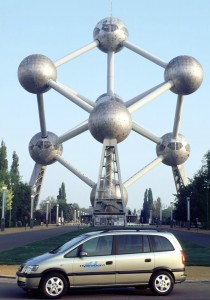
To keep itself running Opel needs cash not hydrogen.
General Motors Europe and the Opel Supervisory Board approved a long-term plan for financial survival at its Rüsselsheim, Germany, headquarters this morning that will be submitted to government representatives.
German Government officials have been skeptical about granting Opel aid, even in the face of worker demonstrations and protests over the roughly 25,000 jobs at stake. It wants more detail.
GM’s Saab unit is facing similar doubts from the Swedish government in its attempt to become independent. GM has said that it will stop supporting Saab this year, but will continue to support Opel for the time being, once the center of its international auto empire.
What Opel terms a “confidential comprehensive” plan includes a funding request for €3.3 billion (US $4.2 billion at current exchange rates) in government support from German and other governments, and $3.8 in support from GM. Opel would also make $1.2 billion in structural cost reductions, presumably by eliminating jobs, manufacturing plants and cutting models. GM or Opel has operations in Belgium, Spain and the United Kingdom as well as Germany.
Opel maintains the plan uses conservative market assumptions and that GM Europe and Opel would become profitable by 2011 if it was implemented. The company has about an 8% market share in Europe. Further details were not publicly released. GM says it is working with representatives of the German government to answer questions and provide additional information that may be required to move the funding process forward. Since workers have representation on the Supervisory Board, there appears to be some union support for cutbacks.
“The discussion with governments is being driven by the exceptionally weak economic situation that has seriously eroded consumer demand for vehicles and shut-out the availability of credit for financing operations,” says GM Europe President Carl-Peter Forster. “We’re moving to restructure our business with as minimal an impact on jobs as possible, but the reality is that we’re in an exceptional economic situation and the issue of plant closings must be considered.”
“We will work with our labor representatives to find the best way forward in mitigating the societal impact of the restructuring, but it should be made clear that we need all three parts of the plan to be viable – the structural cost reductions, government support and GM support. Anything short of this will not result in a viable operation,” Forster says.
GM Europe is also leaving the door open for other sources of financing, however doubtful that may be in frozen global credit markets. It “remains open to discussions on partnerships, equity positions or other alignments that will strengthen the relative position of Opel and GM.” Opel is of course an important part of GM’s global operations. Forster say GM would be willing to sell up to 50% of its stake.
